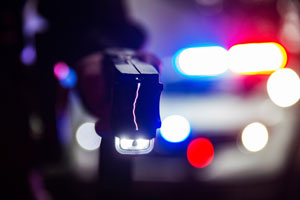The defense of Robert Bates, a former Tulsa Reserve Deputy who was charged with manslaughter, hinged largely on expert testimony. The charges against Bates were filed after Bates shot an unarmed suspect who fled when Tulsa deputies tried to arrest him during an undercover gun buy.
Bates explained that he was trying to shoot the suspect with his Taser but drew his gun by mistake. The manslaughter charge required prosecutors to prove that Bates was guilty of “culpable negligence” in causing the victim’s death.
Trial Evidence
Bates is 74 years old. He was in the insurance business before he became a volunteer deputy in the Tulsa County Sheriff’s Office.
Bates provided support for an undercover operation organized by the Sheriff’s Office. An undercover officer planned to purchase a gun from Eric Courtney Harris, an ex-convict who could not legally possess a firearm.
After the illegal sale allegedly took place, other deputies approached the vehicle in which Harris was sitting. Apparently realizing that he was about to be arrested, Harris bolted from the vehicle and ran.
Bates was parked several blocks away from the undercover transaction. He told an interviewer on NBC’s Today Show that he had participated in hundreds of similar operations, usually coming to the scene after the arrest to assist in taking pictures and gathering evidence.
Deputies Ricardo Vaca and Miranda Munson were with Bates. They testified that Bates had his eyes closed and appeared to be dozing off as they waited. When they saw Harris running toward their position, they left their vehicle and intercepted him. Vaca tackled Harris and took him to the ground, where he held Harris in what he described as a “seatbelt hold.”
Bates did not testify, but he gave a statement to an investigator in which he admitted mistaking his Taser for his gun. He said he decided to shoot Harris with his Taser because he feared that Harris might have a concealed weapon. A sheriff’s deputy testified that Bates’ revolver and the Taser have similar grips and weights.
Bates shot Harris as he was on the ground. Vaca testified that the bullet came within inches of striking him. Another deputy who arrived at the scene testified that he heard Bates yell “Taser.” Vaca said that he would have disengaged from Harris if he had heard Bates announce his intent to fire a Taser. Vaca also testified that even if Harris intended to use his Taser, proper procedure required him to wait until he had a clear opening so that he would not accidentally shoot a deputy who was struggling with the suspect.
Experts Debate Cause of Death
Dr. Cheryl Niblo, a forensic pathologist, testified that Harris died from a “combination of lung collapse and blood loss.” Based on the severe injuries she saw in her autopsy, she concluded that his death was caused by gunshot wounds.
The defense contended that Dr. Niblo failed to review Harris’ medical history and therefore did not know of other medical issues that could have caused his death, including heart disease and methamphetamine use. The defense called two medical experts to refute Dr. Niblo’s conclusion. Dr. Mark Brandenburg, a specialist in emergency medicine, and Dr. James Higgins, an expert in cardiology, agreed that Harris died from a heart attack caused by blockage and the stress of running from and struggling with the police.
In addition to challenging the cause of death, the defense attacked the manslaughter charge by arguing that Bates’ mistaken use of his firearm was reasonable under the circumstances. Dr. Charles Morgan, a psychiatrist who studies human cognitive error in stressful situations, testified that the stress of the moment contributed to Bates’ confusion and that “muscle memory” prompted him to grab his gun instead of his Taser.
Morgan said stress causes even highly trained professionals to make mistakes as a surge of adrenaline blocks “reflective” thinking, forcing the body to resort to “reflexive” or “habitual” actions. On cross-examination, Morgan admitted that his research focused on military personnel and that he did not know whether Bates had sufficient experience with guns to develop muscle memory.
The Verdict
The defense argued that the prosecution should have been required to call experts to testify about law enforcement standards and whether Bates negligently deviated from those standards when he mistakenly shot Harris. The judge ruled that the jury was entitled to base its decision on common sense and that no expert guidance was required.
The jury deliberated only three hours before finding Bates guilty of manslaughter. The maximum sentence that Bates could receive for that conviction is four years in prison.




